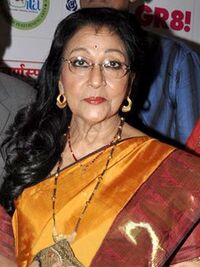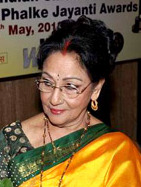Mala Sinha facts for kids
Quick facts for kids
Mala Sinha
|
|
|---|---|

Mala Sinha in 2013
|
|
| Born |
Alda Sinha
11 November 1936 |
| Nationality | Indian |
| Occupation | Actress |
| Years active | 1946–2000 |
|
Works
|
Full list |
| Spouse(s) |
Chidambaram Prasad Lohani
(m. 1966; died 2024) |
| Children | Pratibha Sinha |
Mala Sinha (born Alda Sinha; 11 November 1936) is a famous Indian actress. She mostly worked in Hindi and Bengali movies. She started her career in regional films. Later, she became a top actress in Hindi Cinema during the 1960s and early 1970s.
Mala Sinha was known as a "daring diva." She played strong female characters and took on unusual roles. Many of her movies were considered ahead of their time. She has received many awards, including the Filmfare Lifetime Achievement Award in 2018.
Over four decades, Mala Sinha became very popular. Some of her well-known films include Guru Dutt's Pyaasa (1957) and Yash Chopra's Dhool Ka Phool (1959). She starred in over a hundred films. These include Phir Subah Hogi (1958), Hariyali Aur Rasta (1962), Anpadh (1962), Gumrah (1963), and Himalay Ki God Mein (1965).
Mala Sinha often acted alongside popular actors like Dev Anand, Dharmendra, and Rajesh Khanna. She was one of the highest-paid actresses for many years.
Contents
Early Life and Name Change
Mala Sinha was born to Christian Nepali parents. They moved to West Bengal, India, from the plains of Nepal. Her father's name was Albert Sinha.
Her first name was Alda. Friends at school in Calcutta (now Kolkata) used to tease her. They called her "Dalda," which was a brand of cooking oil. So, when she got her first acting job as a child, she changed her name to Baby Nazma. Later, as an adult actress, she changed it again to Mala Sinha.
As a child, she learned to dance and sing. She was even an approved singer for All India Radio. However, she rarely sang in her movies. She performed in many stage shows as a singer from 1947 to 1975.
Her Acting Journey
Mala Sinha began her acting career as a child in Bengali films. These included Jai Vaishno Devi and Shri Krishan Leela. A famous Bengali director, Ardhendu Bose, saw her in a school play. He asked her father if she could star in his Bengali film Roshanara (1952). This was her first movie as a main actress.
After making a few films in Calcutta, Mala Sinha went to Bombay (now Mumbai). There, she met Geeta Bali, a well-known Bollywood actress. Geeta Bali was impressed by Mala and introduced her to director Kidar Sharma. Sharma cast her in his film Rangeen Ratein.
Her first Hindi film was Badshah, where she acted with Pradeep Kumar. Then came Ekadashi. These early films did not do very well. However, her role in Kishore Sahu's Hamlet earned her great reviews.
Taking on Challenging Roles
Mala Sinha became known for taking on challenging and unusual roles. Films like Nausherwan-E-Adil and Phir Subah Hogi showed her talent. She was seen as a brave actress who took risks with her career choices.
She sang for All India Radio but was usually not allowed to sing in her movies. One rare exception was the 1972 film Lalkar. In the 1950s, she had several hit films with Pradeep Kumar. These included Fashion and Detective.
In 1957, the famous director Guru Dutt cast Mala Sinha in his film Pyaasa. This role was originally meant for another actress, Madhubala. In Pyaasa, Mala Sinha played a woman who chooses to marry a rich man for money, leaving her poor poet lover. Pyaasa is still considered a classic in Indian cinema. It was a big turning point for Mala Sinha's career.
Continued Success
After Pyaasa, her major successes included Phir Subah Hogi (1958) and Yash Chopra's first film as a director, Dhool Ka Phool (1959). These films made her a major dramatic star. She was part of many successful movies from 1958 to the early 1960s. These included Parvarish (1958), Ujala (1959), Love Marriage (1959), Hariyali Aur Rasta (1962), and Anpadh (1962).
She also continued to star in Bengali films throughout the 1950s to the 1970s. Her performances in films like Lookochoori (1958) with Kishore Kumar were well-received.
Popular Pairings and Strong Characters
Mala Sinha's best performances were in films like Bahurani (1963) and Gumrah (1963). Her acting with Raaj Kumar, Rajendra Kumar, Biswajit, and Manoj Kumar was very popular. She often played strong female characters in these movies.
With Biswajit, she made ten films. Their popular movies include Aasra, Night in London, and Do Kaliyaan. In 2007, they both received the Star Screen Lifetime Achievement Award together.
In the 1960s and 1970s, Mala Sinha often acted with both older stars and new actors. She worked with Kishore Kumar, Raj Kapoor, Dev Anand, Dharmendra, and Rajesh Khanna. In many of her films from the 1960s, her character was as important, or even more important, than the male lead. She often received top billing in the movie credits.
Acting in Nepal
In 1966, Mala Sinha went to Nepal to act in a Nepali film called Maitighar. The Nepali film industry was very new at that time. This was the only Nepali film she ever made. She met her future husband, Chidambar Prasad Lohani, who was the hero in the film.
Soon after, she married C. P. Lohani. Their marriage was a long-distance one. Lohani stayed in Kathmandu to manage his business, while Mala Sinha lived in Bombay with their daughter, Pratibha. She continued acting after her marriage.
She was known for her strong, women-focused roles in many films. These include Dhool Ka Phool, Anpadh, Phir Subah Hogi, Hariyali Aur Rasta, Bahurani, Aasra, Do Kaliyaan, and Gumrah.
Mala Sinha especially liked her role in Jahan Ara (1964). This was a historical movie. She had to learn Urdu and royal manners for the part.
From 1974, she started taking fewer main roles in Hindi films. She began playing strong supporting characters. Some of these popular films include 36 Ghante (1974), Zindagi (1976), and Karmayogi (1978).
In the early 1990s, she slowly stepped away from acting. Her last film was Zid (1994). She tried to help her daughter, Pratibha, become an actress, but Pratibha did not achieve the same success.
Personal Life
Mala Sinha married Nepali actor Chidambar Prasad Lohani in 1966. They met while working on the film Maitighar. Lohani had a business in Nepal. After their marriage, Mala Sinha would travel to Mumbai for her film shoots, while her husband stayed in Nepal.
They have one daughter, Pratibha Sinha, who also became an actress. Since the late 1990s, Mala Sinha, her husband, and their daughter have lived in a home in Bandra, Mumbai. Her mother lived with them until she passed away in April 2017. Her daughter, Pratibha, cares for stray dogs and cats at their home.
Mala Sinha's husband, Chidambar Prasad Lohani, passed away in June 2024.
Her Impact on Cinema
Mala Sinha was known for her strong presence in films. Many of her hit movies in the 1960s were successful because of her star power. Even when she acted with big stars, she made sure her role was just as important as theirs.
In 2022, Outlook India magazine included her in their list of "75 Best Bollywood Actresses." Film critic Subhash K. Jha noted that Mala Sinha was always a brave actress. For example, in Dhool Ka Phool, she played the first unmarried mother in Hindi cinema. In Gumrah, she played a wife who had a secret relationship. Many of her roles were considered very modern for their time.
Mala Sinha was one of the highest-paid actresses of the 1960s. She appeared in Box Office India's "Top Actresses" list five times.
Awards and Recognitions
| Year | Award | Category | Film | Result |
|---|---|---|---|---|
| 1965 | Bengal Film Journalists' Association Awards | Best Actress (Hindi) | Jahan Ara | Won |
| 1967 | Himalay Ki God Mein | Won | ||
| 1960 | Filmfare Awards | Best Actress | Dhool Ka Phool | Nominated |
| 1964 | Bahurani | Nominated | ||
| 1965 | Jahan Ara | Nominated | ||
| 1966 | Himalay Ki God Mein | Nominated | ||
| 2018 | Lifetime Achievement Award | Herself | Won | |
| 2007 | Screen Awards | Lifetime Achievement Award | Herself | Won |
Other Special Awards
- 2004 - Sikkim Samman Award from the Government of Sikkim
- 2005 - National Film Awards (Nepal) - Critics Award for Maitighar
- 2013 - Kelvinator GR8! Women Awards: Lifetime Achievement Award
- 2017 - LG Film Award - Special Honour for Maitighar
- 2021 - Deenanath Mangeshkar Vishesh Purashkar: For her great work in Cinema
 | Bessie Coleman |
 | Spann Watson |
 | Jill E. Brown |
 | Sherman W. White |


